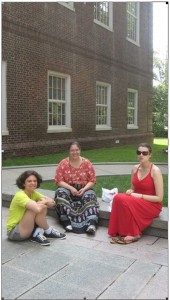Every Time I Come to YIVO I Learn Something That Surprises Me: Interview with Ri Turner

friends from YIVO’s
zumer-program.
by LEAH FALK
Ri Turner, a rabbinical student at Hebrew College in Boston, might hold some sort of YIVO record: she’s a zumer-program (Uriel Weinreich Summer Program in Yiddish Language, Literature, and Culture) graduate and a two-time YIVO-Bard Winter Program on Ashkenazi Civilization alum. This past January, as YIVO’s Ellen Fine scholar, she was among the few students who took four classes at once. Over email, Ri and Leah Falk discussed what brought her to YIVO, intersections between different Winter Program classes, and her “dual master’s degree.”
LF: Tell me a little bit about your background and about what brought you to YIVO.
RT: I grew up in Los Alamos, New Mexico, and went to college at Cornell, where I studied anthropology. After college, I spent some time working and volunteering for various Jewish non-profit organizations. After a couple of years, I decided to start getting ready for rabbinical school—something I had been interested in for a while. After spending a semester in Israel, I moved to Boston to start taking prerequisite courses at Hebrew College. I had a summer free, and I decided it was time to do something else I had wanted to do for a while—learn Yiddish. So I came to the zumer-program in 2012, and that was my first experience at YIVO.
LF: You’re a Winter Program alum who came back for more. What was it about your first experience that made you want to return?
RT: My experience at YIVO has been consistent—every time I come, I learn something that surprises me into thinking about Jewish identity in a new way. In some sense, these chapters of Jewish history have been right under my nose my whole life—but it's not until I come to class and receive guidance from a teacher that the history is opened up for me in a way that helps me understand its significance, relevance, and how startling it is. I've had these experiences elsewhere at times, too, but I have them every time I come to YIVO.
LF: You’re among the few who took four classes at once this year. How did the courses you took inform each other?
RT: Great question! Well, I took three Yiddish literature classes and one American Jewish history class. So in one sense, the classes with the most overlap were the literature classes—mostly, taking three of them at once provoked me to observe and reflect on each professor's pedagogy for teaching literature (and particularly literature in translation). However, the history class (New York Intellectuals Revisited, taught by Adam Kirsch) overlapped as well, particularly with Jonathan Brent's class "The Other Sholem Aleichem." Both classes covered, surprisingly enough, a fair amount of art history and a discussion of the nature of modernism and the avant-garde.
LF: What were some other highlights of this year’s program?
RT: One of my favorite aspects of studying at YIVO is meeting and spending time with faculty, staff, other students, and researchers who are working in the YIVO orbit. I got a chance to spend time with old friends, like Jennifer Young (Director of Education) and Leyzer Burko (currently a CJH Graduate Research Fellow), and I also met some new friends through the classes, including Rivke Galpern, a Baruch College student and Yiddish Farm Summer Program alumna, and Anna Elena Torres, a graduate student at the Berkeley Center for Jewish Studies.
LF: You’re also a rabbinical student at Hebrew College. How do you see the Winter Program offerings fitting into your rabbinical training or complementing it?
RT: I see myself as a dual-degree student: I'm getting my rabbinical training at Hebrew College, and I'm getting a "pretend master's degree" from YIVO in Yiddish language and literature and Ashkenazi Jewish ethnicity studies.
I've been to the YIVO zumer-program twice and now to the Winter Program twice—it truly is an ongoing commitment for me. So people ask me all the time what the connection is between my two fields of study. I could give you a long answer—in fact, I think my entire career will be an answer to that question.
In short, though, I believe that rabbinical work is in large part a matter of understanding, negotiating, and cultivating Jewish identity—especially in the relatively secular, progressive Jewish world in which I'll be working. From that perspective, it's very important to me to understand modern Jewish history, especially Ashkenazi history. Despite the fact that Ashkenazi-descended Jews dominate today's Jewish world politically and culturally, almost no one, especially in younger generations, seems to know anything about Ashkenazi history. To me, this is a glaring problem (and it's also, paradoxically, one of the trends that allows Ashkenazi dominance to go unchecked).
LF: What or who would you like to see at an “all-star” future Winter Program?
RT: One of the best classes I've ever taken at YIVO was "The Emergence of Modern Yiddish Culture" with Dr. Joshua Karlip of Yeshiva University. I'd love to study with Dr. Karlip again, and perhaps explore some of the questions left unanswered in his previous class. In particular, I'm interested in learning more about the history of diaspora nationalism and territorialism, and I'd like to understand what happened to these movements in the wake of World War II. In my fantasy world, YIVO would offer a winter intensive (classes every day!) on these topics, and each day for homework we'd read essays in Yiddish by the likes of Simon Dubnow and Isaac Nachman Steinberg.
Note: Stay tuned for an interview with Joshua Karlip about his new book, The Tragedy of a Generation: The Rise and Fall of Jewish Nationalism in Eastern Europe, in next week’s Yedies.
Leah Falk is YIVO’s Programs Coordinator.